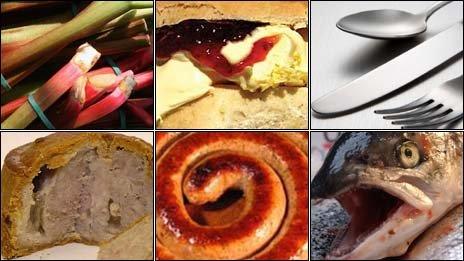Cream tea wars: Does British food need protecting?
- Published
- comments

Devon cream teas are the latest British foodstuff to seek EU protected status. But do the UK's traditional dishes really need looking after?
Honest, simple and unpretentious. Such is the reputation of British cuisine.
Cornish pasties, Cumberland sausages, Melton Mowbray pies - moreish though all might be, none exactly conjure up images of Michelin-starred dining and culinary sophistication.
But all, regardless, have been granted the same gastronomic distinction as Champagne, Parma ham and Kalamata olives.
They are among a growing list of British staples that have been given protected geographical status by the European Union, offering a legal guarantee against imitators.
Supporters of the system say it has elevated the status of UK cooking and generated millions of pounds for businesses.
Critics, however, complain the scheme is illogical and bureaucratic, encourages cartel-like behaviour, sets regions against each other and stifles innovation.
It is a debate that mirrors Britain's relatively recent, television chef-fuelled upswing of interest in cuisine. And the latest foodstuff to provoke a row along this faultline is that most seemingly dainty of afternoon treats, the Devon cream tea.
A coalition of producers recently intensified a campaign to win protected designation of origin (PDO) status for the cream tea by unveiling a vast eight-foot scone at the 116th annual Devon County Show, with an entire marquee devoted to the bid.
But the move has provoked grumblings of discontent from next-door Cornwall, which fears that its similar but proudly distinct tea - cream on top of the jam, rather than vice versa as across the Tamar - could be eclipsed.
The system has form in provoking similar battles between the two counties. Pasty producers from Devon were infuriated when the Cornish variety was given protection, external in February 2011.
However, farm manager Paul Winterton, who is spearheading the Devon cream tea bid, says he is unconcerned about the prospect of re-igniting the West Country's animosities.
At stake, he says, is the very integrity of the cream tea itself.
"What's advertised as a Devon cream tea in the Lake District or somewhere like that might have been made with spray cream," he shudders.
"It's about making sure what people are served is the genuine article. It's also good for the local economy. This isn't something we're doing on a whim - the application process could take up to eight years."
The task of winning recognition - which first involves persuading the Department of Environment, Food and Rural Affairs to back your bid - can indeed be a lengthy one. But there is little doubt that protected status can bring hefty financial benefits.
The scheme was launched in 1992, based on the appellation d'origine controlee label used by the French for wine.
Manufacturers can apply for PDO status - meaning products must be made entirely within a designated area - or protected geographical indication (PGI), meaning they are either prepared, processed or produced within a certain location.
After Welsh lamb was given PGI status, producers saw their income increase by 45% over three years after winning a contract to supply schools in Rome - Italian authorities had insisted pupils should eat only PGI-approved lamb and no suitable suppliers were found in Italy.
Sometimes achieving protection is not always to the advantage of producers, however. The manufacturers of Newcastle Brown Ale were overjoyed to win PDO status for their brand in 2000. But when production was moved to Gateshead and then Yorkshire, brewers Scottish and Newcastle were forced to apply for a cancellation.
Geordie beer lovers might have been glad that there were obstacles in the path of their favourite tipple leaving Tyneside.
But others argue that such red tape gets in the way of businesses delivering the best deal to shoppers.
Daily Telegraph food columnist Rose Prince opposes the Devon cream tea bid, regarding it as spurious and reflective of a system she believes is largely arbitrary and illogical.
Although she welcomes the recognition the system has afforded to British artisan food like cheese, she believes that in general the scheme has favoured the interests of small groups of producers over those of consumers at large.
"The problem I have with the system is that it's about geography rather than taste," she says.
"There's no reason why a pork pie made in a factory in Melton Mowbray should be better than one made by a butcher in Norfolk, for instance."
Not everyone in the food industry is committed to either the pro or anti factions, however.
Others are more ambivalent, welcoming the boost the programme gives to British food in general and independent producers in particular while remaining wary of its excesses.
When Cumberland sausages applied for PGI status, food historian Ivan Day was commissioned to vouch for the recipe's regional ties.
He believes the historical basis for many applications are specious. Nonetheless, he recognises that they raise the profile of many worthwhile dishes.
"I'm sceptical about the whole thing," Day says. "Obviously the people who make it [to protected status] are pushing it for their own commercial advantage.
"But at the same time, I'm also happy that Cumberland sausages, for instance, have got recognition as a regional dish that we're making very well."
Perhaps it is this pragmatic middle road that is most in keeping with the British culinary tradition. There might, after all, be a peaceful outcome to the great cream tea wars.